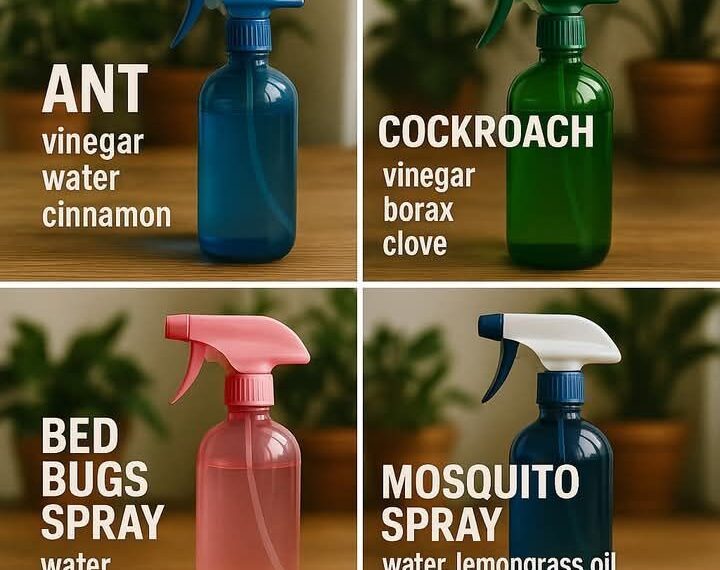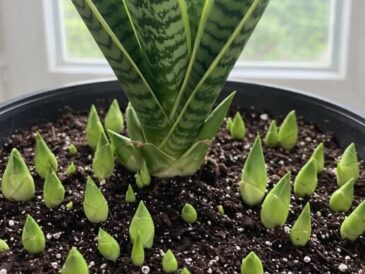Are unwanted bugs invading your home, turning your peaceful space into an uncomfortable battleground? Whether it’s ants marching across your kitchen counters, cockroaches scuttling in dark corners, bed bugs lurking in your bedroom, or mosquitoes buzzing near your windows, dealing with these pests can be frustrating.
But before you reach for harsh chemical sprays that may pose health risks to your family and pets, there’s a better way — natural, safe, and effective DIY pest sprays you can easily make with ingredients right in your kitchen or pantry.
In this guide, you’ll discover 4 easy-to-make natural pest control sprays that will help you reclaim your home from these pesky intruders without exposing your household to toxins. These recipes are affordable, non-toxic, and surprisingly powerful.
Why Choose Natural DIY Pest Sprays?
Many commercial pest control products contain chemicals that can be harmful to humans, pets, and the environment. Plus, bugs can build resistance to synthetic pesticides, making them less effective over time.
Natural sprays use ingredients with properties that repel or kill pests without the side effects of chemicals. They work by disrupting pest behavior, damaging their bodies, or simply masking the scents they use to navigate.
1. DIY Ant Spray
Ingredients:
- 1 cup water
- 1 cup white vinegar
- 1 teaspoon cinnamon powder
How to Make & Use:
- Pour water and vinegar into a clean spray bottle.
- Add cinnamon powder and shake vigorously to mix everything.
- Spray the solution directly on ant trails, around door frames, baseboards, windowsills, countertops, and anywhere you spot ants.
- Reapply daily or after cleaning to maintain effectiveness.
Why It Works:
- Vinegar: Its acidic nature erases the scent trails ants leave for others to follow, confusing their navigation system.
- Cinnamon: Acts as a natural repellent with a scent ants find unpleasant, deterring them from returning.
Bonus Tip:
Keep your kitchen clean and free of crumbs, and seal any cracks or gaps in windows and doors to prevent new ants from entering.
2. DIY Cockroach Spray
Ingredients:
- 1 cup vinegar
- 1 teaspoon borax (a naturally occurring mineral)
- 5 drops clove essential oil (or a pinch of clove powder)
How to Make & Use:
- Combine all ingredients in a spray bottle and shake well.
- Spray into cracks, under appliances, inside cupboards, around drains, and other places cockroaches hide.
- Use regularly for best results.
Why It Works:
- Borax: Acts as a desiccant, drying out cockroaches’ exoskeletons and eventually killing them.
- Clove Oil: Has a strong smell that repels roaches and disrupts their activity.
Safety Note:
Borax can be toxic if ingested, so keep this spray away from children and pets. Use it only in areas inaccessible to them.
3. DIY Bed Bug Spray
Ingredients:
- 1 cup water
- 1 tablespoon diatomaceous earth (food-grade only)
How to Make & Use:
- Add water and diatomaceous earth to a spray bottle. Shake well before each use, as the powder settles quickly.
- Lightly spray mattresses, headboards, bed frames, and corners where bed bugs hide. Avoid soaking the fabric.
- Let it dry completely before using the bed again. Repeat regularly until infestation subsides.
Why It Works:
- Diatomaceous Earth: A fine powder made from fossilized algae. It damages the waxy exoskeleton of bed bugs, causing them to dehydrate and die.
Safety Precaution:
Avoid breathing in the powder—use the spray in a well-ventilated room and consider wearing a mask during application.
4. DIY Mosquito Spray
Ingredients:
- 1 cup water
- 10 drops lemongrass essential oil
- 10 drops citronella essential oil
How to Make & Use:
- Mix water and essential oils in a spray bottle.
- Spray around windows, doors, outdoor patios, curtains, and light fixtures to deter mosquitoes.
- Reapply frequently, especially after rain or heavy wind.
Why It Works:
- Citronella and Lemongrass Oils: Both are widely known natural mosquito repellents. Their strong citrusy scents confuse mosquitoes and keep them away from treated areas.
Extra Tip:
Combine this spray with other mosquito deterrents such as citronella candles or mosquito nets for comprehensive protection.
Bonus Tips for Effective Natural Pest Control
- Use Separate Bottles: Dedicate one clean spray bottle per recipe to avoid mixing ingredients.
- Store Properly: Keep your sprays in a cool, dark place to preserve their potency. Shake well before each use.
- Test Surfaces: Before spraying on fabrics or wood, test a small, hidden area to avoid discoloration or damage.
- Maintain Cleanliness: Regular cleaning and removing food sources can dramatically reduce pest problems.
- Seal Entry Points: Use caulk or weatherstripping to close cracks and gaps where bugs enter.
- Avoid Overwatering Plants Indoors: Excess moisture attracts pests. Keep soil dry and plants healthy.
- Encourage Beneficial Insects: Ladybugs and spiders prey on harmful pests—welcome them into your garden naturally.
Why These Natural Solutions Work Better Long-Term
Natural pest sprays focus on prevention and creating an environment pests find inhospitable. Unlike harsh pesticides, they don’t poison the ecosystem or your household and are less likely to cause resistance in pests.
Incorporating these sprays into your routine helps create a safer, healthier home for your family, pets, and even beneficial insects like bees.
Common Questions About Natural Pest Sprays
Q: How often should I apply these sprays?
A: Generally, daily application is best during peak pest seasons, or after cleaning or rainfall which may wash the sprays away.
Q: Can I combine any of these sprays?
A: It’s best to keep each spray separate to maintain effectiveness. Mixing could reduce potency or cause reactions.
Q: Are essential oils safe for pets?
A: Some essential oils can be toxic to pets. Use sprays with caution around animals, and consult a vet if unsure.
Q: Can these sprays completely eliminate infestations?
A: For severe infestations, natural sprays help but may need to be combined with other pest control methods or professional help.
Final Thoughts: Nature’s Best Defenses Against Household Pests
Nature offers powerful and safe alternatives to toxic chemical pest controls. With common ingredients like vinegar, cinnamon, borax, clove, diatomaceous earth, and essential oils, you can craft effective sprays to keep ants, cockroaches, bed bugs, and mosquitoes at bay.
These remedies not only protect your home but also reduce exposure to harmful substances, contributing to a healthier living environment for you and your loved ones.
Tag a friend who’s struggling with pest problems and share these simple DIY solutions! Nature’s best defenses are just a spray away. 🌿✨





